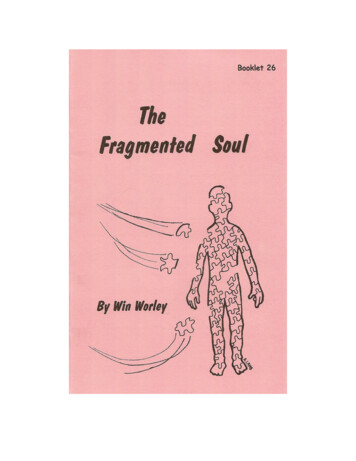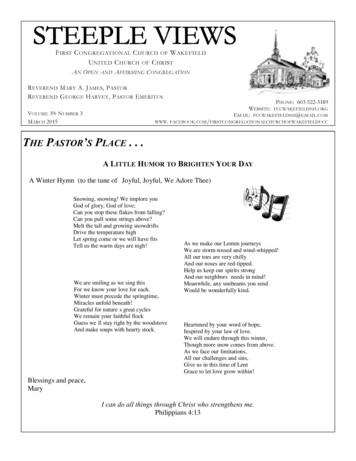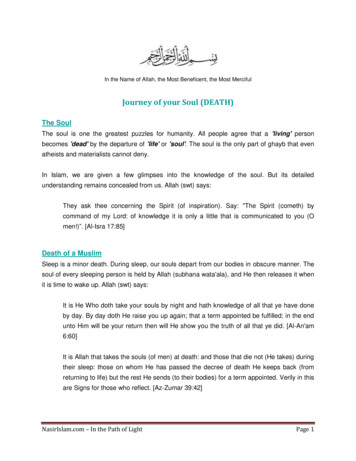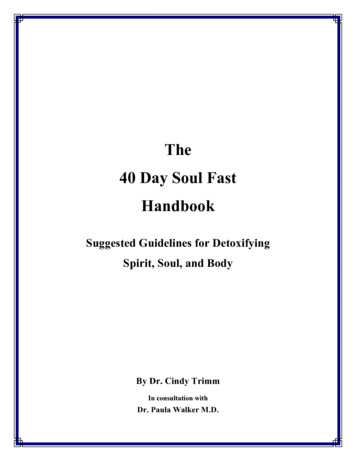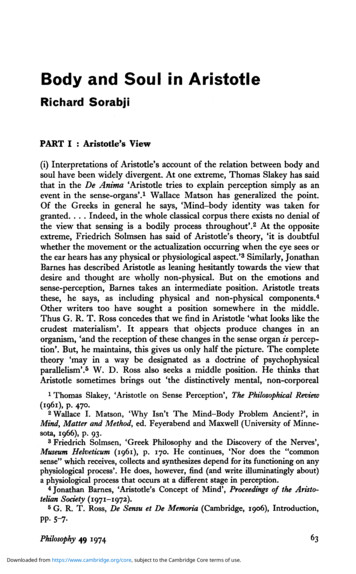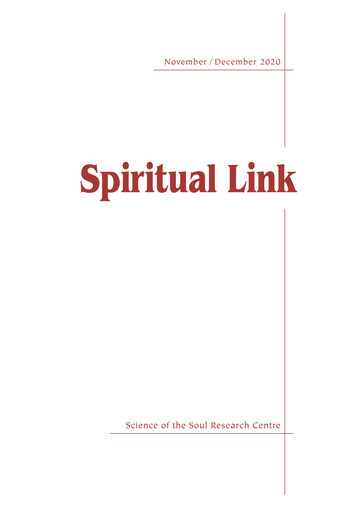
Transcription
November / December 2020Science of the Soul Research Centre
hed by Clouds Laden With LoveSeeker of Lost SoulsTruth in a Nutshell PerspectiveThe Quotient QuestionSurrenderThe Fragrance of LoveThe Seva of 2020An Arranged MarriageGoing WithinZenlightenmentA Death to End All DeathsFacing DiscouragementThe Value of TimeThe Day Everything ChangedFood for ThoughtThe Ladder of PerfectionWhat the Living Master Does for UsThe Eternal BondThe Bright Side of LifeBook ReviewSpiritual LinkScience of the Soul Research CentreGuru Ravi Dass Marg, Pusa Road, New Delhi-110005, IndiaCopyright 2020 Science of the Soul Research Centre Articles and poems that appear without sources have been written by thecontributors to this magazine.VOLUME 16 ISSUE 6 NOVEMBER / DECEMBER 2020November / December 20203
Drenched by Clouds Laden With LoveI was trailing the shadows of rituals,Of customs and holy books;But my Master cameAnd placed a lamp in my hand.A lamp brimmingWith the oil of love he gave,With a wick that will never run short;In its light I have finished all transactions,I will never again visit this marketplace.When Kabir met the MasterThe light of knowledge Illuminated his heart;Let me never forget him! In him I found a saviour –Through the grace of the Lord.When the perfect Master I metAll my worries were driven away;He made my soul immaculate –Now he is ever at my side.I took the dice of love;I made my body the pawn;As taught by my Master, I threw the dice –Thus played Kabir and won the game.The Master became pleased with me,He whispered one word of grace;The cloud of love poured forthAnd drenched my entire being.Kabir, clouds laden with loveIn abundance poured down on me;Within, my soul was drenched,And around me even the desert turned green.Kabir, The Weaver of God’s Name4Spiritual Link
Seeker of Lost SoulsRecently I watched a film called The Water Diviner, starring RussellCrowe. Set in the immediate aftermath of World War I, the film centreson the character he plays – an Australian farmer and water divinercalled Joshua Connor – and follows his journey across Turkey in searchof his three missing sons who were reported missing in action and arepresumed dead. As I watched the drama unfold, I was struck by thesimilarities between Connor’s story and what we are told of the missionof the Masters.The soul divinerThe hero’s journey to the other side of the world reminded me of how theMaster comes in human form to awaken us. The gulf between the regionof pure spirit – Shabd – and this physical world is difficult to imagine butI gained a flicker of insight as I watched Connor leave outback Australia,a vast, remote wilderness, impervious to time, for the blood-soaked battlefields of Gallipoli that historians describe as “one of the worst fronts of theFirst World War.”Connor’s journey is prompted by a promise to his dying wife that,whatever happens, he will bring his sons’ bodies back to Australia andbury them beside her. Like Connor, the mystics leave their abode onlyunder direct orders from the Lord. Guru Gobind Singh, for instance,states: “I had no desire to come into this world, but the Lord so willed itand sent me here.”Why does a mystic obey this call and, leaving the region of purespirit, travel to its polar opposite? The answer is love. Just as it is love thatcompels Connor to honour his vow, the Master seeks us out of love for theLord. The ‘us’, however, is not the outer, transitory self, but the soul. TheMaster relentlessly travels the length and breadth of the world in search ofthose under his charge. Connor is an expert water diviner (someone whois able to locate sources of water). The Master is something more – he isable to locate thirsty souls.It’s important to remember that the Master looks not only for hisown ‘flock’ but for those entrusted to him by his Master. In Philosophy ofNovember / December 20205
the Masters, Vol. V, Maharaj Sawan Singh informs us that, just beforetheir demise, mystics “hand over the office of the Guru to another so that the work of connecting the souls with the Lord and redeemingthem should continue.” The present Master once reminded a group ofsatsangis that Maharaj Charan Singh had loved roses, telling the groupthat they were all his roses and he had been given the seva of gardener tolook after them.Living waterWater is an essential sustenance for all forms of life, down to the tiniestorganism. Connor’s ability to find water in the Australian outback(semi-arid bush where temperatures can reach more than fifty degreescentigrade and rain is infrequent) ensures the survival of his community.Since water is so critical to life, perhaps it’s unsurprising that ‘living water’is one of the oldest and most commonly used metaphors to describe God’screative power (the Shabd or Word), and also the gift of initiation. Theearliest evidence of this metaphor is in scriptures found in the MiddleEast, dating as far back as 4,000 BCE. For a largely dry, agrarian society,the presence of water is paramount. As noted in A Treasury of MysticTerms, Vol. III:Without water, there is no physical life. Without the Living Water, there isno creation. Without conscious contact with the Living Water there is nosalvation for a soul caught in the entanglements of physical existence.As the quotation indicates, the soul is entangled in the inertness ofillusion. To attain freedom, it must drink the Living Water to awakenthat which is inert. The Master alone is able to locate this. As the GreatMaster explains:All true devotees get the Shabd, which is real life, from the perfect Guru.He is life in himself, and since he is free from the ego, the Shabd speaksthrough him. He has transcended the valley of death. He has realized thelife of the Lord, which works through the Sound, and he himself can givethat life or spiritual awakening to his disciples.6Spiritual Link
As spiritual seekers, we often think that the Master’s only role is tomend our broken souls and unite them with the divine. But as the GreatMaster reminds us, “The duties of the Guru are infinite,” including,for instance, looking after the entire universe. That a mystic’s care andprotection is not confined to his ‘sheep’, but is all-encompassing isillustrated by the actions of the present Master during the coronaviruspandemic, by providing food and shelter to thousands of strandedmigrants, donating funds to the Indian government’s Relief Fund, anddistributing packed lunches to those in need.Diviners’ magnetismA water diviner, (meaning ‘to foresee, foretell, predict or to prophesy’), isdeemed to be endowed with an innate ability to locate water beneath theground’s surface by using different types of instruments, including electromagnetic rods. Divination remains a controversial topic, but it remindsme how the mystics find the souls for whom they are responsible. Relevanthere are the Great Master’s observations about the “rays of purity” mysticsconstantly radiate and their “magnetic attraction.” He states: “Whenever aMaster appears in the world, seekers for the real truth are attracted to himlike moths, and like bees they hover round that living flower of spiritualityand enjoy its taste.”Before we commit to Sant Mat, we are encouraged to read widely aboutthe philosophy, to reflect upon the teachings, and to reach a decisionbased on our assessment. Although this is an essential step and cannotbe bypassed, ultimately it is not the words on the page which support ourdecision but how we feel in the presence of the Master. As explained inThe Spiritual Guide, Vol. I:[An] individual knows when he has found his guru. It is not just anintellectual belief, but deep down, in the inner recesses of the soul, thereis a sense of acceptance, contentment, and peace because one has cometo one’s teacher. Vivekananda says: “When the sun rises, we ultimatelybecome aware of the fact, and when a teacher of men comes to help us, thesoul will instinctively know that truth has already begun to shine upon it.”November / December 20207
Special opportunitiesYou might think it strange that these thoughts came into my mind asI watched the film. It seemed a miracle that the Master came to mindwhen I was doing something mundane. There are so many opportunitiesin our daily life to think of him that we’re often not even conscious ofthem. Whenever we see or hear anything that reminds us of the Master,we could think of it as a personal message from him; it’s one of the waysin which he reminds us of his presence. The Master is a part of our lives.He is always with us, whether we’re sitting in meditation or engaged inthe world, and we should not for one moment think we’re separate fromhim. Even in our moments of deepest sorrow, he is with us. All we needis to be grateful for the moments when we feel his presence and try toextend this as much as we can. To me, this is the miracle and magic ofour life: the constant opportunity to remember and, thus, be with him.8Spiritual Link
Truth in a Nutshell PerspectiveThe English painter, Constable, once told a lady who was surprised thathe was painting a building she thought unattractive: “No, Madam, thereis nothing ugly; I never saw an ugly thing in my life: for let the form of anobject be what it may, light, shade and perspective will always make itbeautiful.”Merlin Waterson quoted in Simple Pleasures***As an artist, what Constable meant by perspective was the physicalviewpoint from which an object is seen. Likewise, we also use the word“perspective” to refer to a viewpoint. If we live by simple, honest andloving values, it gives us a mental perspective in which plain thingsbecome beautiful. Maharaj Sawan Singh said:A palace will appear as dreadful as a graveyard to a person who is bereftof love. But even the ill-furnished and dilapidated huts are beautiful if theyare brightened with the spark of love. Through love, even jungles becomefilled with happy life, and without love, populated cities may appear bleak.Love is the richest of all treasures. Without it there is nothing and with itthere is everything.Maharaj Sawan Singh, Philosophy of the Masters, Vol. II.November / December 20209
The Quotient QuestionThere is no pause in the miracles being played out every second in God’screation – the creation we live in. Floating in the vast nothingness,countless celestial bodies move around each other in a faultless andunending dance, untethered to anything. Life on our planet – includingnearly eight and a half million species – miraculously propagates itself,without pause, to perfection. A tiny seed contains a whole tree. Twoliving beings give birth to life in their own image, complete with facultiesof sight, sound, smell, taste, instinct and emotion to live out their ownexistence. And we take all this for granted, almost as a right owed to us.The wondrous nature of God’s universe doesn’t stop here. The miracleof diversity in his creation is spellbinding. No two living things are alike,be they human, animal, or plant life. The scale is beyond calculation.Unique in itself, each individual living particle is different from the others,just as no two fingerprints of the nearly seven and a half billion humansmatch, or no two blades of grass are the same.If all forms of life were uniform in their appearance, character andaptitude, it would be impossible to differentiate one from the other. It isdiversity that lends each individual its distinct and separate identity.The human species has engaged itself in not only recognizingthese differences, but also grading them according to assumed levelsof importance. Placing the intelligence quotient centre stage, and theemotional and creative quotients in the flanks, those of adversity, jobs andeverything else, including spirituality, have been consigned to backstage.The quotient parameters were designed to identify the talent bestable to catapult us to a better, brighter future. That happened, but not ina balanced way. The current condition of our planet is witness to that.The world we have nurtured is one of division, competition, inequality,distrust, and hatred. We have damaged the very environment that sustainsus. We seem to have erred somewhere, perhaps in granting undueimportance to the intelligence quotient at the expense of all the rest.When it comes to love and marriage, matchmaking is a challengingtask in which we don’t give weight to just one or two qualities such aswealth and fame. We also weigh aspects of goodness, respect, compassion,10Spiritual Link
generosity, and background to achieve a balanced view of the intendedliaison, ensuring that a relationship will survive the test of time.Where the rest of life is concerned, we falter in giving far toomuch weight to the quotient of intelligence. Individually, attributes ofintelligence can tip us either way, towards the positive or the negative.It’s the same for anything we view in isolation. It’s only when we view allattributes collectively that we get a balanced and favourable outcome.The quotient question explores the need to identify the one quotientwhich balances all others – a sieve of deeper understanding, of soulsearching, not just mind-searching; one that looks inward, not onlyoutward; one that applies to all equally, not singularly. This is the spiritualquotient, the one that has never received the importance it deserves.Spirituality is at the core of all life. It is the base without which nothingcan exist, animate or inanimate. As we move away from our core intothe mind’s arena, we weaken the association with our spiritual reality.The mind, a formidable foe of spirituality, is a wanderer by nature. Neverconstant, it is always restless and on the move, jumping from one thing toanother, never fulfilled.Had the mind been an agreeable companion of the soul, and if ithad placed the spirituality quotient at the forefront, the world wouldhave witnessed progress in peace, equality, trust and unity. Just a singlequotient would put everything in balance, giving respect to all life,irrespective of its level.The spiritual quotient is well represented in the theory of dharm(responsibility) and adharm (lawlessness), as well as maryada (decorumor decency). Keeper of our conscience, principles, morals and values, iteducates us on our responsibilities and duties towards God’s creation. Itpresents us with a guide for how to live life in a grateful and balanced way,with restraint and respect towards all that has come into existence. It offersa boundary drawn to ensure decorum, decency and equilibrium in ourrelationship with the creation.We live in an ever-changing world where nothing is constant. Such isthe nature of life. Social and cultural landscapes are struggling to adapt tothe frantic pace of change the world is going through; in just a century, ourexperience has spanned from travel in bullock carts to space flights andNovember / December 202011
artificial intelligence. The world may become very different in the nexthalf century. Probabilities on that horizon may present us with robots asan integral part of family life, sharing our emotions and giving us advice.Artificial wombs to nurture life in labs might become commonplace alongwith genetic modifications to produce life with predetermined attributes.The quotient parameters, as we see them now, will be beyondrecognition by then – unless we wake up and start applying our spiritualquotient to the future, in every action and every thought. Unlike otherquotients, spirituality is plural; it applies to all equally. It is not selfish, itdoes not place anyone at a disadvantage, it does not harm anyone. It is ablessing, without which we won’t be human.Let us keep the balance in all that we pursue. Let us not make ourselvesless human. Let us not lose our spiritual core.12Spiritual Link
SurrenderIf one were to ask what is the most challenging thing about followinga spiritual path, most of us would probably reply, “Meditation.” Butperhaps something else is even more difficult: surrender. This requiresus to view all of life’s events dispassionately and not through the prismof ‘good’ or ‘bad’. In fact, during a recent question-and-answer session,Baba Ji said that practising meditation is easier than unconditionallysurrendering to the Master. So what is surrender?Shelter, obedience and bhanaThe Sanskrit term for ‘surrender’ is sharan, meaning ‘to take refuge,’which, in the context of spirituality, means to take the shelter of a Master.As mystics explain, the irrevocable law created by the Lord is that no onecan meet the Lord without a Master. By taking the Master’s shelter, wecommit to changing our lifestyle to one that is suited to the attainmentof spiritual liberation. We may need to give up previous habits (suchas eating meat or taking intoxicants) as well as any competing spiritualpractices. As the Great Master writes in Philosophy of the Masters,Vol.V, “When one is reborn in the house of the Master, that is, when onetakes shelter with him, one should give up all previous spiritual or otherpractices and ask him what to do. It is the duty of the disciple to follow thepath taught to him by the Master.” The Great Master is not asserting thesuperiority of one form of spirituality over another; rather, he is stressingthe importance of finding a path we can commit ourselves to. It is muchmore difficult to realize our spiritual goals if we keep changing direction.A second aspect of surrender is obedience or, as the mystics putit, subordination of one’s will to that of the Master. By relying on himentirely, we are to give ourselves up to him in much the same way as, forinstance, putting our life in the hands of a surgeon. Surrender meansbeing confident that whatever the Master directs us to do is for ourbenefit, especially when his suggestions seem puzzling. The Great Masterstates: “When one takes shelter with the Master, one must be like a child.He must give up his own will and conform to the will of the Master. Hemust surrender himself to the Master in word, deed and spirit.”November / December 202013
Aside from the four vows we take during our initiation into the path ofSant Mat, how else might we obey our Master? Once we begin to see theMaster as the helmsman of our life, we must perform every deed with aview to pleasing him, and minimize the chatter of our mind by repeatingsimran. Given the sheer scale of information, technologies, and activitiesvying for our attention, turning away from them to remember the Masterdemonstrates our sincerity.A third aspect of surrender means learning to live in the will of theLord – accepting everything unfolding before us with neither too muchjoy nor sadness. This idea is captured in the Punjabi word, bhana. InSpiritual Discourses, Vol. I, Maharaj Charan Singh gives the followingexplanation of why spiritual liberation is dependent on submission to thewill of the Lord:If we can learn to be indifferent to pleasure and pain, so that they do nottake us away from our path, it would not only lessen the weight of ourkarmas, but they would also be paid off in much less time. If you can takewhat comes to you through him, then, whatever it is, it becomes divine initself; shame becomes honour, bitterness becomes sweet, and gross darknessbecomes clear light.If we view all that is happening to us as a result of our Master’s wishes,our love for him transforms how we respond. Maybe we could view ourlife experience like a garden in which we can grow our love for the Lord.Since all plants need sunshine and rain to grow, we can use pleasure andpain as opportunities to deepen our love for him. When, for instance,pleasure is in our destiny, we could show our gratitude by extending ourmeditation by even fifteen to thirty minutes. And when pain is in ourdestiny, we could mould our mindset to be even more grateful. We couldtrain our mind to be glad that our karma is being paid off and, like rocketfuel, is turbo-boosting our journey home.To surrender, we must accept. Although living in Master’s will canbe difficult, if we can train ourselves to live with fewer desires and to becontent with whatever he provides, then we are getting closer to what itmeans to surrender unconditionally. This is aptly described in The Pathof the Masters:14Spiritual Link
What is really meant by complete surrender to a Master is this: Outof perfect confidence and great love, the disciple gladly follows wherethe Master Leads. That is the sum of it all. By perfect surrender to aMaster, in this sense, one gains everything, ending in the most perfectliberty. This is well expressed by one great Sufi, who said: “Give us allyou have and we will give you all we possess!” By surrendering all to theMaster, you gain everything.The Fragrance of LoveTulsi Sahib was the epitome of love and was pleased to see true love inthe behaviour of his disciples and devotees. He once went to Agra andvisited the home of Soami Ji Maharaj in Panni Lane. When the womenof the neighbourhood came to know of the Satguru’s (Tulsi Sahib’s)presence, they ran to receive his darshan. Though some of them werebusy with housework, they ran to him without bothering to clean andtidy themselves. After reaching Soami Ji’s house, they bowed down at theSatguru’s feet and sat down around him. Seeing their dirty, untidy, andsmelly clothes, a disciple of Tulsi Sahib asked them to sit at some distanceand told them that their clothes reeked of sweat. Tulsi Sahib stopped himand lovingly said, “No, no! Let them be seated in a manner they like; youare not aware of the fragrance of their love. You cannot comprehend theintensity of their love – you may get a foul smell from them, but I do not.”Tulsi Sahib, Saint of HathrasNovember / December 202015
The Seva of 20202020 started with the coronavirus furorInstilling fear across the world,We were filled with anxiety to the core,And then came the lockdown only to add more.My Master as usual had planned it all out for me,As he came to my rescue, my anxiety fled.He opened the doors of seva for meHow blessed am I when I have no reason to be.It all started with helping the needy,But even here I was selfish and greedy.Front face I was doing the seva for the unfortunate,But back of mind it was my Master I wanted to please.It was the best experience of my life,During a phase when I could have been crying.In the name of seva, he was doing it allAnd giving us the credit, we did not deserve at all.Now I understood why he created this digital world –To bless us with his darshan which we were craving,One look at him, we were at ease and relievedFrom the insecurity of when we would see him!With his grace, food preparation and packing sevaWere smoothly and safely executed.He bestowed upon us the energy to do it,Which normally was impossible!We all became like sheepAnd he the shepherd guided us all the way through.The days spent here will always be cherished;These overwhelming memories will remain embedded.16Spiritual Link
The lockdown period just flew by,He kept me busy with no time to fret or cry,I will always be grateful, for I was one of the chosen few.Master, bless me, so I can live up to your expectation.I am not going to call this my covid-19 seva,I don’t want such negativity to destroy my memories.It will remain in my heart as a bounty –This spectacular seva of 2020!November / December 202017
An Arranged MarriageIn response to questions put to him, we often hear Baba Ji say that everyday is not a sunny day. Just as weather is variable, it is natural to encountervarious phases during our spiritual journey. There are periods duringwhich complying with the Master’s instructions seems fairly straightforward but, at other times, our struggle intensifies. We may, for instance, feeldevoid of love for the Master, or become so preoccupied by our flaws thatwe find ourselves unworthy of following the Sant Mat path. As we workthrough these stormy periods, it’s not uncommon for us to succumb towhat is commonly known as the ‘imposter syndrome’.Described first by American clinical psychologists in the late 1970s,the imposter syndrome refers to high-achieving individuals attributingtheir success not to hard work but to luck, timing, the support of amentor, or some other situational factor. Typically, such individuals viewthemselves as undeserving of the professional accolades bestowed uponthem. Applied to spirituality, we may – when suffering from the impostorsyndrome – feel like frauds who will be found out any moment. We feelthat everyone else in the sangat belongs but we are impostors, and oursupposed spiritual failings make us despondent. This is quite wrong. Wemay be different from others but that is exactly what the Lord likes. Wecan clearly see one characteristic of the Lord by studying his creation: theendless variety of creatures in the oceans, in the insect world, and amongbirds and beasts – the Lord loves variety! Therefore, we should just beourselves. There is no correct formula for a disciple.The imposter syndrome is a problem because it fails to recognizethat our quest to attain eternal liberation is not the result of our volitionbut is, instead, attributable to the grace of the Lord. As the Jesuit mysticAnthony de Mello wrote: “It is not that God is a big dancer and you are alittle dancer. You are not a dancer at all. You are being danced.” MaharajCharan Singh elaborates on this idea in Spiritual Perspectives, Vol. I, byemphasizing that, when it comes to initiation, “Neither the disciple has anychoice, nor the Master has any choice.” Under instruction from the Lord,18Spiritual Link
the Master does not have the right to refuse initiation to any soul allottedto him but, equally, neither is his flock able to resist his call. Or, as MaharajCharan Singh puts it, those souls assigned to a Master have no option butto go to him whenever he beckons.The Master is therefore stuck with us. He did not pick his sangat, norcan he exchange it for a more pleasing group. Our agency is even morecircumscribed. Before being born, our life had already been arranged insuch a way to automatically draw us to the Master. The master-disciplerelationship is therefore a match made in heaven and implemented onearth and, like the individuals in an arranged marriage, both must learn tolove one another.You can check out, but you can never leaveOnce the Lord has marked us for initiation, our destiny is comparableto a line from the song “Hotel California,” by the American rock bandThe Eagles: “You can check out any time you like, but you can neverleave”. We may decide to exercise our very limited choice by ‘checkingout’ and ignore our meditation. However, there is no escaping divinelaw. Destined to become one with the divine, not only is it impossible forus to resign from Sant Mat but, eventually, our spiritual work will needto be completed – by us. Try as we might, this is not something we canoff-load to the Master.Unlike us, the Master epitomizes the perfect sevadar. Fulfilling hisduty to the Lord, somehow or other he ensures that we reach SachKhand, even if there are periods during which we stray from Sant Mataltogether. Maharaj Charan Singh elaborates on this by citing the analogyfrom the Gospel of Saint John about the shepherd and his flock of sheep.In Spiritual Perspectives, Vol. II, Maharaj Charan Singh explains:The shepherd has been entrusted with a hundred sheep. One sheep goesastray out of the fold. The shepherd leaves ninety-nine sheep and runsafter that one particular sheep and even physically lifts that sheep onhis shoulder to bring it back to the fold because he’s responsible for allhundred sheep .November / December 202019
The success of the shepherd’s mission is not dependent on his flock,irrespective of how hard they thwart his efforts. Even if only one or two goastray, the shepherd does not return to the farmer until every single one ofhis flock is safely enclosed within its pen.There is no time to indulge in the imposter syndrome in spirituality.We have embarked on a spiritual adventure because the Lord has chosenus to return home. By expressing an earnest desire to be with him overthe course of many lifetimes, we have finally earned our place in his flock.If we did not belong in his sangat, no power would enable us to force ourway in. So instead of focusing on our unworthiness, it behooves us tofocus on fulfilling our spiritual commitment.Renewing our spiritual vowsNowadays, it has become popular for old married couples to renew theirmarriage vows. Since many of us have been initiated for a long time,perhaps the initial excitement has worn off. If this is the case, why notrenew our vows to the Master as follows?“Do you take the Master to be your lawful wedded guru, to have andto hold, to honour and obey, in sickness and in health, in poverty andin wealth, for better or for worse, from this day forward until deathyou do join?”And we say, “I do.”20Spiritual Link
Going WithinWe often come across the term “going within” or “going inside” eitherin satsang or when reading the Sant Mat literature. But what does thisactually mean? Drawing on examples from the physical world might helpus obtain a better insight into this spiritual concept.Accessing documents stored on a computer, for instance, requires usto start on the “outside” by logging on with the right credentials. Thenwe identify the relevant file and, clicking one sub-folder after another, weeventually reach the file we want.Alternatively, we could turn to our history lessons for an example.During the Middle Ages, the king would give a private audience in theinner sanctum of his chamber. Those granted a royal interview wouldenter by passing through a series of antechambers until they reachedhis presence.The point illustrated by these two examples is that “going in”involves traversing outer layers to reach a special, inner point.Similarly, in Sant Mat, “going within” means redirecting our outwardlyfocused attention
He made my soul immaculate - Now he is ever at my side. I took the dice of love; I made my body the pawn; As taught by my Master, I threw the dice - Thus played Kabir and won the game. The Master became pleased with me, He whispered one word of grace; The cloud of love poured forth And drenched my entire being. Kabir, clouds laden with love

